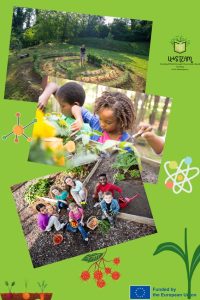Permaculture Education for Children:
Nurturing Sustainable Futures with UrbSTEAM Erasmus+ Project
Permaculture, a holistic approach to sustainable living, offers valuable lessons that should be imparted to children from an early age. By integrating permaculture principles into education, initiatives like the UrbSTEAM Erasmus+ Project can play a pivotal role in shaping environmentally conscious and responsible citizens.
Permaculture, derived from “permanent agriculture” or “permanent culture,” focuses on designing systems that mimic natural ecosystems, emphasizing sustainability, diversity, and regeneration. Teaching permaculture to children aligns perfectly with the UrbSTEAM Erasmus+ Project’s mission, which seeks to foster Urban Science, Technology, Engineering, Arts, and Mathematics (STEAM) education for sustainable urban development.
Here are a few compelling reasons why permaculture should be introduced to children through projects like UrbSTEAM:

- Connection to Nature: Permaculture encourages a deep connection with the environment. It teaches children to observe and understand natural processes, fostering empathy and respect for the Earth.
- Sustainable Living: UrbSTEAM and permaculture share a common goal of sustainable living. Children exposed to permaculture principles learn the importance of resource conservation, reducing waste, and making responsible choices in their daily lives.
- Problem-Solving Skills: Permaculture promotes critical thinking and problem-solving, vital skills in the STEAM fields. It encourages children to design creative solutions for environmental challenges, aligning with UrbSTEAM’s emphasis on innovative urban development.
- Community and Collaboration: Both permaculture and UrbSTEAM underscore the significance of community involvement. Children learn the value of working together to achieve common goals, fostering a sense of responsibility and cooperation.
- Hands-On Learning: Permaculture is best learned through practical experience. UrbSTEAM projects can incorporate permaculture practices such as gardening, composting, and sustainable energy use, offering children the opportunity for hands-on learning.
- Ethical Values: Permaculture principles include care for the Earth, care for people, and fair share, instilling ethical values in children that align with UrbSTEAM’s mission to create inclusive and equitable urban environments.
In conclusion, permaculture education for children, integrated into initiatives like the UrbSTEAM Erasmus+ Project, holds immense potential for shaping environmentally aware, innovative, and socially responsible individuals. By nurturing a love for nature, sustainable living practices, and the skills required for a brighter future, these combined efforts can create a generation committed to building sustainable and thriving urban communities.
